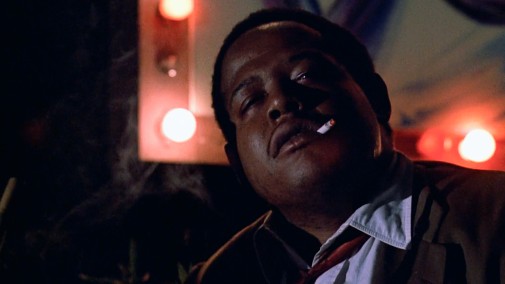
After two Cannes Best Actress winners who failed to nab an Oscar nomination, the Almost There series arrives at one of the French festival's male acting champions. In 1988, Forest Whitaker starred as legendary bebop innovator and jazz saxophonist Charlie "Bird" Parker in a Clint Eastwood-helmed. At Cannes, he won the big prize, and, on paper, the movie does seem like an obvious awards contender. It's from an acclaimed auteur, a traditional epically long biopic, and it came just two years after critics and the Academy had embraced the similarly-themed 'Round Midnight. However, Bird was only nominated for -and ended up winning- the Best Sound Oscar, leaving its leading man unheralded…
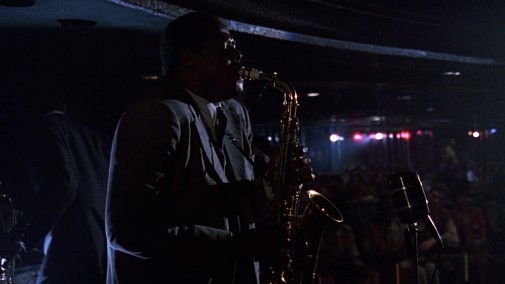
In Bird, we're constantly looking at Charlie Parker from other peoples' perspectives. His wife, bandmates, disgruntled erstwhile colleagues, doctors, and more take on POV duties, while the protagonist is regularly behind a metaphorical glass wall. Whitaker and Eastwood, working from a screenplay by Joel Oliansky, thus create a strange portrait of the historical figure. The actor plays a through-line, but the director shatters our perception of the characterization in distinct fragments, sometimes tender, sometimes sharp. The final result is ungainly but fascinating to observe. As a biopic, Bird is conventional while slightly twisted in uncomfortable ways. This approach illuminates both the limitations and possibilities of the subgenre.
Nevertheless, for the most part, Forest Whitaker takes this movie Charlie Parker beyond the self-destructive musician archetype familiar to the Oscar-hopeful biopic. The actor may not evoke the specific genius of this historical figure, but he does create the bruising evocation of a complicated man. His careful characterization smooths over the wrinkly dysfunction of Eastwood's structure and deepens a film that would be much shallower without his actorly contribution. That's apparent from his very first moments on-screen when he plays the saxophone and starts establishing the vision of a man for whom music presented an escape only comparable to the effect of the substances he kept abusing.
There's such energy, such life, to the scenes when he's playing. I'm not qualified to say if he seems believable as a saxophone player or if he replicates Parker's style with authenticity. However, as a casual viewer, one can understand that the emotional truth of the artist's passion shines through. It's in the way he smirks after a particularly speedy passage, how his eyes drift upwards in near-religious reverence, the restless body vibrating with enthusiasm. Such elation is made more obvious when it's followed by Parker's stumbling return to the domestic sphere. In these early scenes at home with family, everything is so under-lit one can barely see the actors' faces. Nonetheless, Whitaker leaves a strong impression, his body language singing long arias of internal unrest.
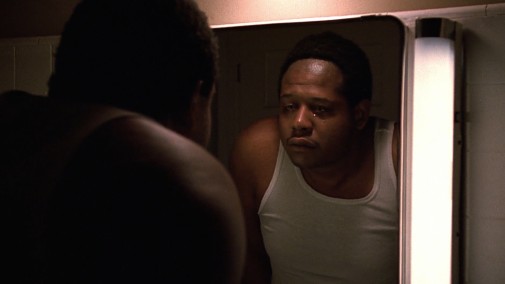
It's as if he's still electrified by some mysterious current, gradually losing that that high. Facing the stony visage of Diane Venora's Chan Parker, the artist's wife, Whitaker is like a deflating balloon. The performance transcends the clichés of intoxicated playacting. It reaches for something a bit more heightened, befitting the mercurial man whose body is capable of producing incredible music but suddenly crashes before a justified spousal glare. Whitaker's power makes this first sequence with Venora into a dangerous dance of mindless mirth curdling into aggression, atonement-seeking softness, and back to aggression before settling into angst. It's as if Whitaker is using his instrument of acting to play out dissonant notes and variations of tone, making for a jazzy take on a scene of marital tension.
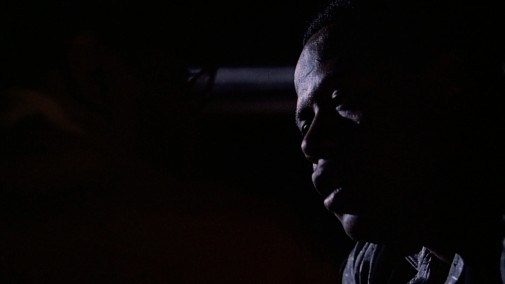
Apart from Venora's Chan, Samuel E. Wright is the leading man's best screen partner. In conversations featuring Wright's Dizzy Gillespie, Bird shows interest in portraying Parker as an avant-garde artist and an African-American man whose life has been shaped and eroded by persistent racism. Beyond such examples, the biopic is strangely reticent in regards to those themes. The textual limitation constricts what Whitaker can do with the role, even while these specific conversational moments showcase another side of the performance. I'm especially fond of the pensive shame that emerges from a seaside chat under the moonlight. Whitaker's silver-lined profile on the beach is piercing stuff, haunting in the best way.
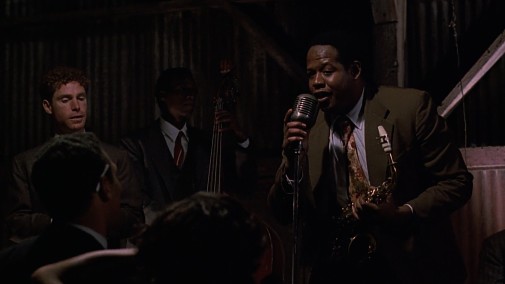
Alternatively, there's great fun in Parker's amusement when messing up with his white trumpeter played by Michael Zelniker. The attachment between the two gradually becomes sorrowful, however. As "Red Albino" Rodney starts experimenting with drugs, the saxophonist's friendship sours into worry and, eventually, a stormy swirling ball of guilt. Whatever morsels of playfulness Whitaker peppers throughout, always function as a prelude to further darkness. For example, the back-and-forth flashbacks, disjointed as they are, give us a chance to see the actor play a very different version of Charlie Parker. One who hadn't yet been irreversibly changed by years of addiction and a father's grief.
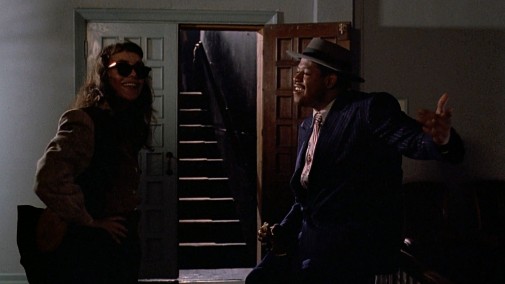
The windows into blossoming romance are lovely, but they're under the shadow of future miseries. A scene when Parker greets his family while lip-synching to a crooning record is another highlight before it devolves into more sadness. Not that Whitaker's take on the character is a mere parade of contrasting states of extreme feeling. The swallowed-down emotion while he sends a telegram to his wife, begging her not to bury their daughter before he returns home, is a tremulous wonder precisely because of how the actor limits his levels of demonstrativeness. One can feel Whitaker trying to exteriorize Parker's inner torment by tamping down the miasma of blame and agony that threatens to overwhelm him.
The grieving father's repeated speech makes it more horrifying to witness, a promise turned into desperate prayer, trembling nerves morphing into narcotized ramblings. His last phone call to Chan is similarly wrenching. Who knew Forest Whitaker was such a good phone actor? This may seem like an odd comparison, but his gift to suggest what's not being said in a telephonic conversation reminded me a great deal of Montgomery Clift in The Misfits. Both actors invoke a crushing sense of tragedy when performing the social theatre of pretending everything is alright to a telephone speaker while their facial expressions implode. It's masterful stuff, bold if not subtle, devastating too.
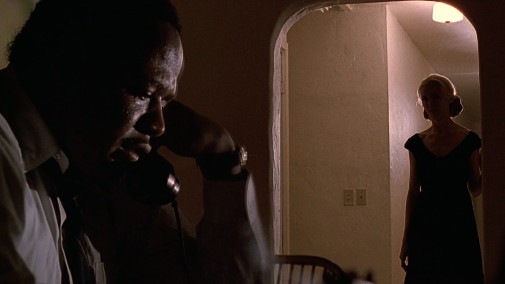
At the Cannes Film Festival, Bird didn't just win Forest Whitaker a Best Actor honor. The soundtrack was also rewarded with a Technical Grand Prize, a predecessor to the movie's eventual Oscar victory. Bird's two BAFTA nods were also for sonic achievements, but the Golden Globes showed it more love with three nods and a win for Best Director. Forest Whitaker was among those nominated by the HFPA. However, AMPAs ended up choosing five other actors: Gene Hackman in Mississippi Burning, Tom Hanks in Big, Dustin Hoffman in Rain Man, Edward James Olmos in Stand and Deliver, and Max von Sydow in Pelle, the Conqueror. Hoffman won, and it's easy to imagine either Olmos or Sydow as the fifth placer. Forest Whitaker would take home his own Best Actor Oscar 18 years later for The Last King of Scotland.
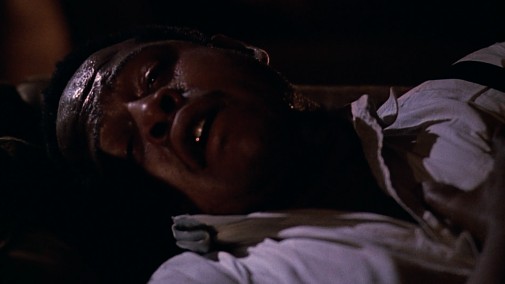
You can find Bird, available to rent, on most services.